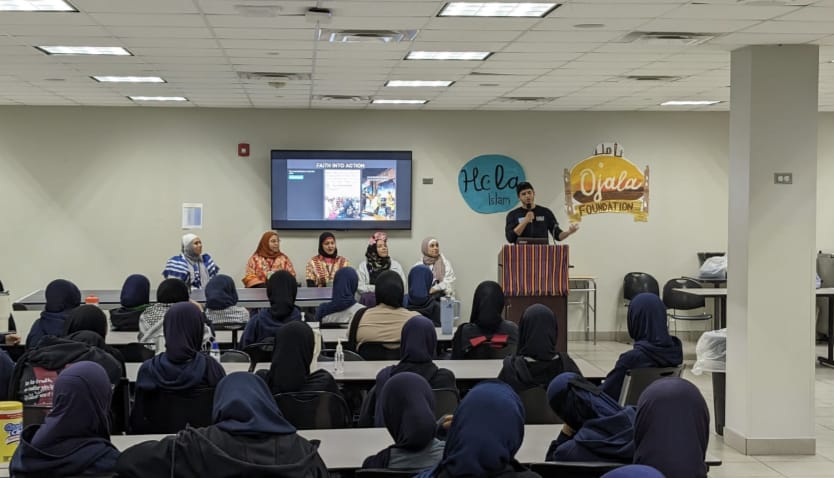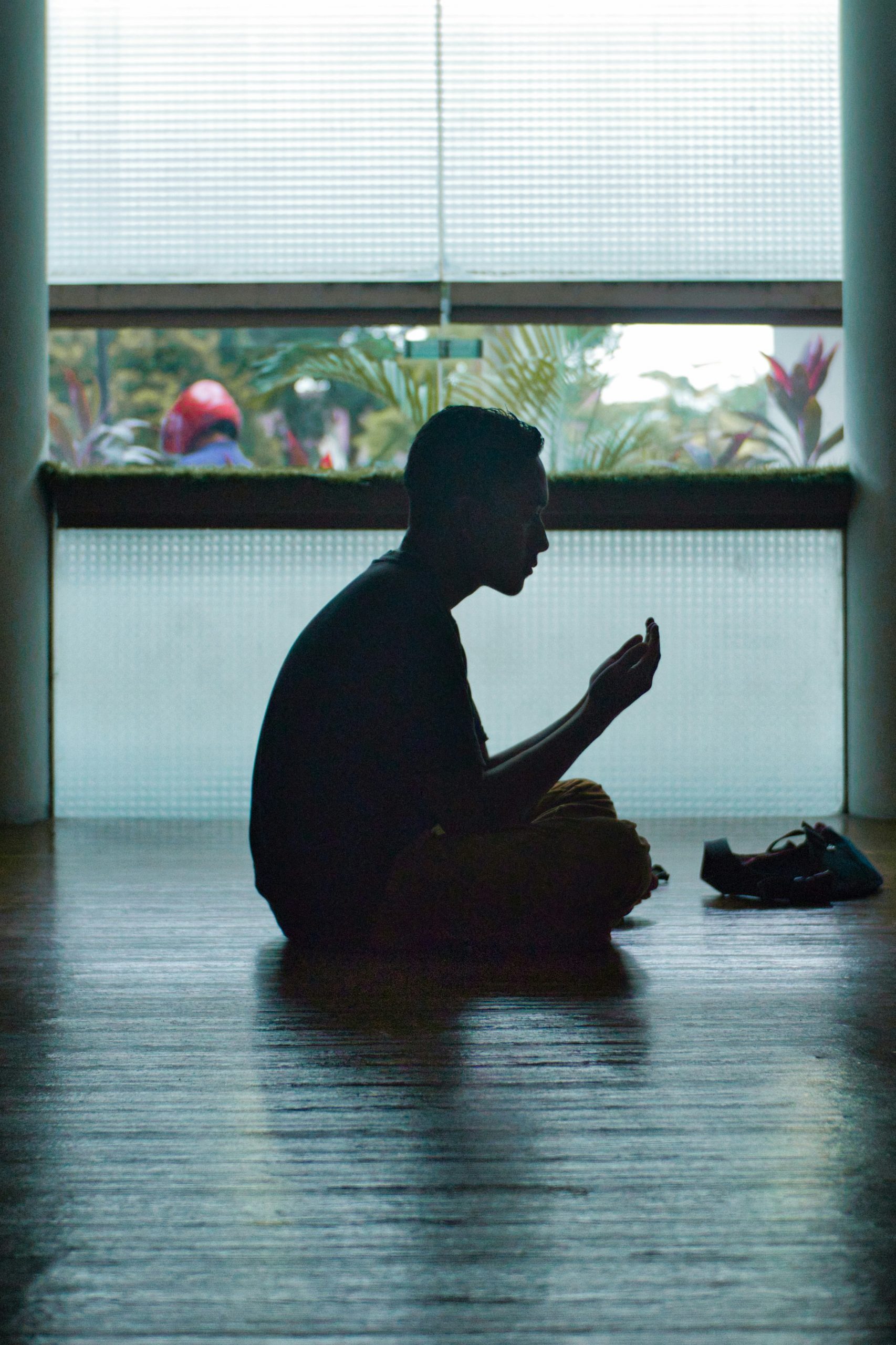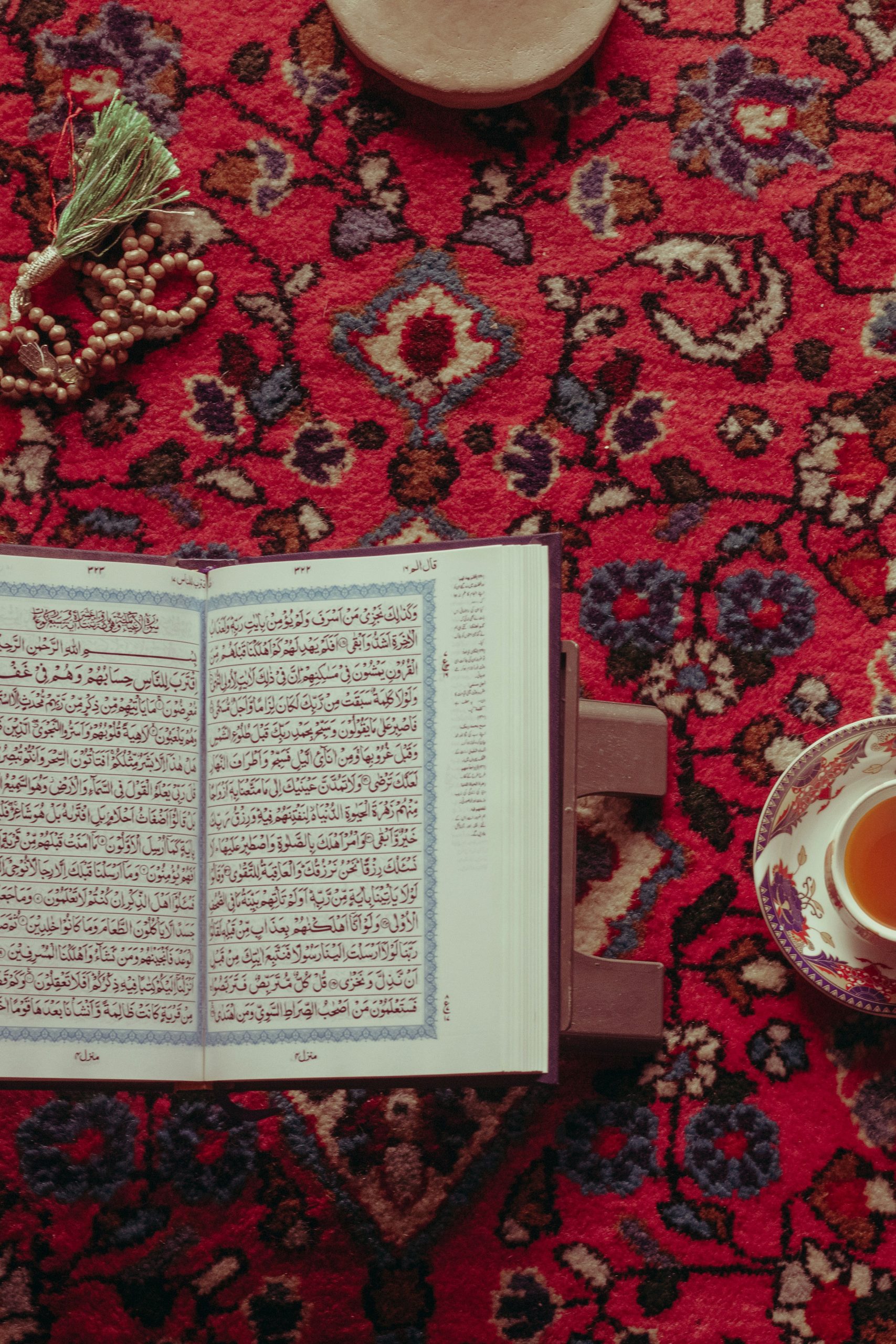Reading Time
- Summary Transcript: ~5 minutes
- Full Transcript: ~32 minutes
Learning Objectives
- Identify the concept of Ihsan and its significance in Islamic teachings.
- Understand how to beautify one’s Qur’anic recitation through the principles of Tajweed and proper articulation.
- Differentiate between Tafakkur (reflection) and Tadabbur (contemplation and action) in relation to the Qur’an.
- Explore the ethical guidelines for animal treatment, including humane slaughter and prohibitions against cruelty.
- Analyze the Prophet ﷺ’s guidance on Ihsan during conflict, including the prohibition of mutilation and harm to non-combatants.
- Reflect on the Qur’anic verses that emphasize striving for excellence in worship, personal conduct, and interactions with others.
- Learn the various levels of response to life’s trials, from patience to gratitude, and their spiritual implications.
- Recognize the importance of humility when engaging with the Qur’an and its teachings.
- Examine the role of Ihsan in daily life and how it transforms mundane actions into acts of worship.
- Appreciate the reward promised by Allah for those who live with Ihsan, as outlined in the Qur’an.
- Develop practical strategies for embodying Ihsan in worship, relationships, and ethical decision-making.
Class Summary
Living with Ihsan: Excellence in All Aspects of Life
Islam emphasizes the concept of Ihsan (excellence), urging believers to approach every aspect of life—worship, relationships, and daily actions—with care and integrity. This principle is deeply rooted in the Qur’an and Sunnah and serves as a means to draw closer to Allah. Below, we summarize key lessons from Islamic teachings on Ihsan, covering Qur’anic recitation, ethical treatment of animals, and personal conduct.
Beautifying Qur’anic Recitation
The Qur’an encourages not only regular recitation but also beautifying one’s voice during it. This practice, called Tahseen As-Sawt, involves using Tajweed (correct pronunciation and articulation) to enhance the melody of recitation. The Prophet ﷺ praised companions like Abu Musa al-Ash’ari for their captivating voices and highlighted that those who lack natural vocal talent can achieve beauty through practice and dedication.
Reflection on the Qur’an: Beyond recitation, believers are urged to reflect on the Qur’an’s meanings, repeating verses to internalize their lessons. The Qur’an is described as a personal letter from Allah, meant to inspire humility, action, and a deeper connection to its guidance.
Ihsan in Worship and Conduct
Ihsan is not limited to recitation but extends to all forms of worship. It involves approaching Allah with sincerity and striving to perform acts of worship with both outward excellence and inner devotion. Reflection on the Qur’an, patience during trials, and gratitude for Allah’s blessings are key elements of Ihsan in worship.
Ethics and Ihsan in Everyday Life
Treatment of Animals
The Prophet ﷺ taught humane practices in animal treatment, including ethical slaughter. He instructed that knives should be sharpened and hidden from the animal, and that animals should not witness the slaughter of others. Even harmful creatures should not be killed using fire or in cruel ways, underscoring the importance of compassion in all dealings.
Ihsan in War
Even in war, Ihsan applies. The Prophet ﷺ forbade mutilation, killing of non-combatants, and inhumane treatment of prisoners, demonstrating that Islamic ethics uphold dignity and mercy in all circumstances.
Applying Ihsan to Trials and Daily Actions
Ihsan also governs how Muslims respond to life’s trials. While patience is essential, the highest level of Ihsan is gratitude, where believers recognize trials as opportunities to strengthen their relationship with Allah. Similarly, in daily actions—whether working, studying, or helping others—believers are urged to pursue excellence as an expression of faith.
Why Ihsan Matters
The Qur’an reminds us that the purpose of life is to strive for excellence: “He who created death and life to test you as to which of you is best in deed” (Surah Al-Mulk). In return, Allah promises Ihsan as a reward for those who live with Ihsan: “Is the reward for Ihsan anything but Ihsan?” (Surah Ar-Rahman).
Conclusion: Strive for Excellence in All You Do
Living with Ihsan transforms mundane actions into acts of worship, brings beauty to relationships, and deepens one’s connection to Allah. Whether in Qur’anic recitation, ethical treatment of animals, or navigating trials, Ihsan serves as the standard for believers. Let us strive to embody this excellence and seek Allah’s ultimate reward: His mercy and eternal Ihsan in the Hereafter.
Full Transcript
As-salamu alaykum wa rahmatullahi wa barakatuhu. Alhamdulillahi rabbil alameen, salallahu wasallam wa baraka nabiyyin wa Muhammadin wa ala alihi wa sahbihi wa sallam taslimin kathiran amma ba’d. Welcome back to the classes we are studying right now from the chapter of “Faslun Fi Tahseen As-Sawt,” beautifying your voice when it comes to the recitation of the Qur’an. Imam Ibn Qudamah, rahimahullah ta’ala, when he finished the secrets of the Ibadat, came to the recitation of the Qur’an.
The Virtue and Etiquette of Qur’anic Recitation
We talked about the virtue of reciting the Qur’an itself and the etiquette of reciting the Qur’an. Now we are discussing together one of the specific etiquettes of the recitation of the Qur’an, and that is “Tahseen As-Sawt bil Qur’an,” beautifying your voice with the Qur’an. Let’s see that, insha’Allah ta’ala. Bismillah.
Beautifying the Voice in Qur’anic Recitation
Imam Ibn Qudamah, rahimahullah, says in section three, beautifying the voice with the Qur’an. It is recommended to recite in a beautiful voice, “Tahseen Al-Qira.” If one does not have a fine voice, “Hassan As-Sawt,” he should beautify it as much as he can. As for reading with modulated sounds, the predecessors used to dislike it.
Alhamdulillah rabbil alameen, wa salallahu wa sallam wa baraka nabiyyin Muhammadin wa ba’d. So the ayat, rahimahullah, begin by saying, “wa istahabu tahseen al-qira,” it is recommended that you recite with a beautiful voice. Then he mentions something as a disclaimer here: If one does not have a fine voice, then he should beautify it as much as possible. What does that mean? That means a beautiful voice is one of two things: whether it is a gift from Allah subhanahu wa ta’ala or a skill that you can acquire.
Some people, Allah subhanahu wa ta’ala made it very natural for them to have beautiful voices. Those are blessed; it’s a gift from Allah azza wa jal. Some of the Sahabah, radiallahu anhum, were known for that. One of them was Abu Musa al-Ash’ari, radiallahu anhu wa rida. One night, the Prophet salallahu alaihi wa sallam was passing by, and he overheard Abu Musa al-Ash’ari in his home. The Prophet salallahu alaihi wa sallam was captivated by his beautiful voice. The next day, when he met him, he said, “If you had seen me last night listening to your recitation of the Qur’an…” Abu Musa al-Ash’ari was surprised and said, “Ya Rasulallah, wallahi, if I had known you were listening to me, I would have made it even more beautiful.”
Imagine this: If his casual recitation mesmerized the Prophet salallahu alaihi wa sallam, think about how it would sound if he made an extra effort to beautify it. Now, if you don’t have a naturally beautiful voice, what can you do? Some people say, “I have a deep voice,” or “I have a very sharp voice.” What can be done in this case? What would help you beautify your recitation of the Qur’an? The answer is Tajweed. If you learn the Tajweed of Qur’an, the ahkam of Tajweed, and the makharij of al-huroof (the articulation points of the Arabic letters), that alone will make your voice melodious, regardless of whether you have a naturally beautiful voice or not.
I’ve seen people whose voices are not naturally good. In fact, they are far from it. But they made an effort, learned Tajweed, perfected the makharij al-huroof, and now they teach people Qur’an. It’s not that their voice became perfect, but their recitation with Tajweed makes their recitation beautiful.
Reflecting on the Qur’an
In a hadith of the Prophet salallahu alaihi wa sallam mentioned in Sahih al-Bukhari and Muslim, the Prophet salallahu alaihi wa sallam said, “Allah has never listened to anything as He listens to a prophet with a beautiful voice who recites the Qur’an.” The meaning here is not that Allah “listens” in a human way but that Allah appreciates it.
If you have a Qur’an at home, keep using it. The reciter of the Qur’an should contemplate Allah’s kindness to His creation by letting the meanings of His speech reach their understanding. They must know that what they are reading is not the speech of men and should envision the greatness of the speaker. Let them contemplate His words, for contemplation is the main purpose of reading the Qur’an. If that cannot be achieved except by repeating a verse, let them repeat it.
For example, the Prophet salallahu alaihi wa sallam once stood a whole night repeating the verse: “If You punish them, indeed they are Your servants.” He kept repeating it, reflecting on its meaning. Imagine reflecting on this verse over and over, allowing it to touch your heart deeply.
The same has been said about others. Tamim al-Dari, radiallahu anhu, once stood in prayer repeating the verse: “Do those who commit evils think we will make them like those who have believed and done righteous deeds?”
Not everyone will reflect on every verse the same way. Some verses will strike a chord with you, while others might not. Reflect on the verses that move your heart. Repeat them.
Contemplation and Action
When the Qur’an describes the wrongdoers or the punishment awaiting them, make yourself fear the consequences of disobedience. Don’t view the stories of the Qur’an as mere entertainment. These stories are lessons. Reflect on the message and ask yourself, “What action does this require from me?”
Reflection on the Qur’an is not just about understanding the words. It’s about internalizing the message and acting on it. If a single verse stops you in your tracks and makes you change your behavior, that’s more valuable than reciting an entire chapter without understanding it.
When you recite verses about Allah’s greatness, pause and reflect. When you read about creation, ponder its majesty and what it reveals about Allah’s power. The Qur’an is an invitation to reflect, not just recite.
However, don’t misinterpret the Qur’an. Reflection (tafakkur and tadabbur) must stay within the boundaries of correct understanding. Interpretation requires knowledge, but reflection is personal and meant to inspire action.
Obstacles to Understanding the Qur’an
If sins, pride, or whims dominate your heart, they act like rust on a mirror, preventing you from understanding the Qur’an. Remove these obstacles to polish your heart so it can reflect the meanings of the Qur’an clearly.
Approaching the Qur’an with Humility
When you read the Qur’an, think of it as a personal letter from Allah to you. Approach it with humility and a sense of urgency to act on its commands. Recite it as though it is addressing you directly. Reflect deeply, repeat verses that resonate with you, and strive to align your actions with its teachings.
Ihsan (Excellence) in All Actions
The Prophet ﷺ emphasized the importance of Ihsan (excellence) in all actions, as shown in his guidance on the treatment of animals and other living beings. He said, “Allah has made Ihsan obligatory in all things. So when you kill, kill with Ihsan, and when you slaughter, slaughter with Ihsan. Let one of you sharpen his knife and spare suffering to the animal.”
Ihsan in War
This principle applies to everything, even in matters of war. The Prophet ﷺ prohibited mutilation and emphasized the humane treatment of prisoners and combatants. He once saw a woman who had been killed in battle and said, “Who killed this woman? She was not fighting.” He expressed his disapproval of such actions.
The Incident of the Tribe of Urayna
In another instance, a group of people from the tribe of Urayna came to Madinah and fell ill due to its climate. The Prophet ﷺ instructed them to go to the area where the camels of Zakah were kept, drink from their milk and urine, and recover. However, after regaining their health, they attacked the camel herders, killed them, and stole the camels. When they were caught, the punishment they received matched the heinous crimes they had committed. This incident demonstrates the gravity of their actions and serves as a deterrent for others.
Prohibition of Punishment by Fire
The Prophet ﷺ also prohibited the use of fire as a method of punishment. In an earlier instance, he had permitted it, but later abrogated this, saying, “No one punishes with fire except Allah.”
Ethical Treatment of Animals
Even in dealing with harmful creatures, Ihsan must be observed. The Prophet ﷺ discouraged the use of fire to kill insects or vermin. For example, burning a scorpion was considered a form of mutilation. He also prohibited using live animals as target practice, saying, “Do not take a living creature as a target.”
When slaughtering animals, the Prophet ﷺ taught that the process should be done with the utmost care and compassion. He instructed that the knife be sharpened and hidden from the animal to reduce its stress. The animal should not see another being slaughtered, and the cut should be swift and clean to minimize suffering. He even addressed the treatment of young animals, ensuring that they were not separated from their mothers prematurely.
Conclusion: Striving for Ihsan
These teachings of Ihsan extend beyond acts of worship and into every aspect of life, including interactions with others, personal conduct, and even mundane activities. Ihsan is not merely about outward actions but also reflects the state of one’s heart and intentions. For example, in times of hardship, one can display different levels of response: impatience and displeasure, patience, acceptance, and ultimately gratitude. The highest level is gratitude, where one recognizes that even trials are an opportunity for closeness to Allah.
The Qur’an reminds us of the significance of Ihsan, saying, “He who created death and life to test you as to which of you is best in deed” (Surah Al-Mulk). This highlights that our purpose in life is to strive for excellence in all that we do. In return, Allah rewards those who act with Ihsan, as He says, “Is the reward for Ihsan anything but Ihsan?” (Surah Ar-Rahman).
As Muslims, we should strive to embody Ihsan in every facet of our lives, from our worship to our dealings with others, and even in how we interact with the world around us. May Allah grant us the ability to act with Ihsan in all our affairs and reward us with His Ihsan in both this world and the Hereafter. Ameen.
Q&A
- What is Ihsan in Islam?
- Answer: Ihsan refers to excellence or perfection in all aspects of life, including worship, personal conduct, and interactions with others.
- How can one beautify their Qur’anic recitation?
- Answer: By learning Tajweed, practicing correct pronunciation and articulation (makharij al-huroof), and striving to improve the melody of their voice.
- What did the Prophet ﷺ say about the importance of beautifying one’s voice during recitation?
- Answer: He said that Allah appreciates the recitation of a prophet or person with a beautiful voice and emphasized striving to enhance one’s recitation.
- What is the difference between Tafakkur and Tadabbur in relation to the Qur’an?
- Answer: Tafakkur is reflecting deeply on the meanings of the verses, while Tadabbur involves contemplating their application in daily life and taking action.
- What are the levels of response to trials according to Islamic teachings?
- Answer: Displeasure (failing the test), patience (remaining silent while internally dissatisfied), acceptance (being at peace with Allah’s decree), and gratitude (thanking Allah for the trial as an opportunity to grow closer to Him).
- What guidance did the Prophet ﷺ give regarding ethical slaughter of animals?
- Answer: Sharpen the knife, conceal it from the animal, ensure the cut is swift and clean, and avoid letting animals witness the slaughter of others.
- What is the ruling on using fire to kill animals or insects?
- Answer: The Prophet ﷺ prohibited using fire as a means of punishment, stating that only Allah punishes with fire.
- What is the significance of Ihsan in war?
- Answer: The Prophet ﷺ prohibited mutilation, killing of non-combatants, and inhumane treatment, emphasizing dignity and mercy even in conflict.
- How does the Qur’an describe the purpose of life in relation to Ihsan?
- Answer: The Qur’an states that Allah created life and death to test who among us is best in deeds (Surah Al-Mulk).
- What does the Qur’an say about the reward for those who live with Ihsan?
- Answer: The Qur’an affirms, “Is the reward for Ihsan anything but Ihsan?” (Surah Ar-Rahman), implying excellence is rewarded with excellence in the Hereafter.
- How does reflecting on the Qur’an help a believer?
- Answer: It deepens their understanding, inspires action, and strengthens their relationship with Allah.
- What did the Prophet ﷺ say about treating animals with Ihsan?
- Answer: He instructed that animals should be treated with compassion, including during slaughter, and forbade using them as targets or tools for entertainment.
- What does the Qur’an encourage regarding personal conduct and Ihsan?
- Answer: To act with sincerity and excellence in every action, striving to reflect the teachings of Islam in daily life.
- What did the Prophet ﷺ say about using Ihsan in all actions?
- Answer: He declared, “Allah has made Ihsan obligatory in all things,” urging believers to seek excellence in worship, work, and relationships.
- What role does humility play in reflecting on the Qur’an?
- Answer: Humility allows one to approach Allah’s words as a personal guide, inspiring a deeper connection and greater application in life.
The post Study Classical Texts the Traditional Way | Session 27 appeared first on MuslimMatters.org.


 “The amount of people finding a home with our community only leads us to believe that this Center will be the first of many because the need is just that great and our communities are thirsty for the positive change, structure and self discipline that Islam provides,” says Pavcilek. The mosque will particularly focus on services for Latino Muslims, who make up over a quarter of a million people in the United States. To date, he says, there has not been a specific focus on this community, leading to “the feeling that we need to give up a piece of our beautiful and vibrant culture in order to become a part of the greater Muslim community.”
“The amount of people finding a home with our community only leads us to believe that this Center will be the first of many because the need is just that great and our communities are thirsty for the positive change, structure and self discipline that Islam provides,” says Pavcilek. The mosque will particularly focus on services for Latino Muslims, who make up over a quarter of a million people in the United States. To date, he says, there has not been a specific focus on this community, leading to “the feeling that we need to give up a piece of our beautiful and vibrant culture in order to become a part of the greater Muslim community.” Guidance, strengthen the outreach of Islam within their ethnic community, which forms about a third of Chicago’s population. “Having our own center would allow anyone and everyone to come and see for themselves what Islam is all about from people that are literally just like them, from the same neighborhoods and of the same culture. It is a huge game changer and has led to many entire families embracing Islam over time with some having 3-4 generations of Latino Muslim family members after just a few years.”
Guidance, strengthen the outreach of Islam within their ethnic community, which forms about a third of Chicago’s population. “Having our own center would allow anyone and everyone to come and see for themselves what Islam is all about from people that are literally just like them, from the same neighborhoods and of the same culture. It is a huge game changer and has led to many entire families embracing Islam over time with some having 3-4 generations of Latino Muslim family members after just a few years.”




 did not receive any revelation from Allah
did not receive any revelation from Allah 








 “Exalted is He who holds all control in His hands; who has power over all things; who created death and life to test you and reveal which of you does best.” [Surah al-Mulk: 67; 1-2]
“Exalted is He who holds all control in His hands; who has power over all things; who created death and life to test you and reveal which of you does best.” [Surah al-Mulk: 67; 1-2]

 “Indeed, when Satan whispers to those mindful of Allah, they remember their Lord, then they start to see things clearly.” [Surah Al-A’raf ; 7 : 200-201]
“Indeed, when Satan whispers to those mindful of Allah, they remember their Lord, then they start to see things clearly.” [Surah Al-A’raf ; 7 : 200-201]

